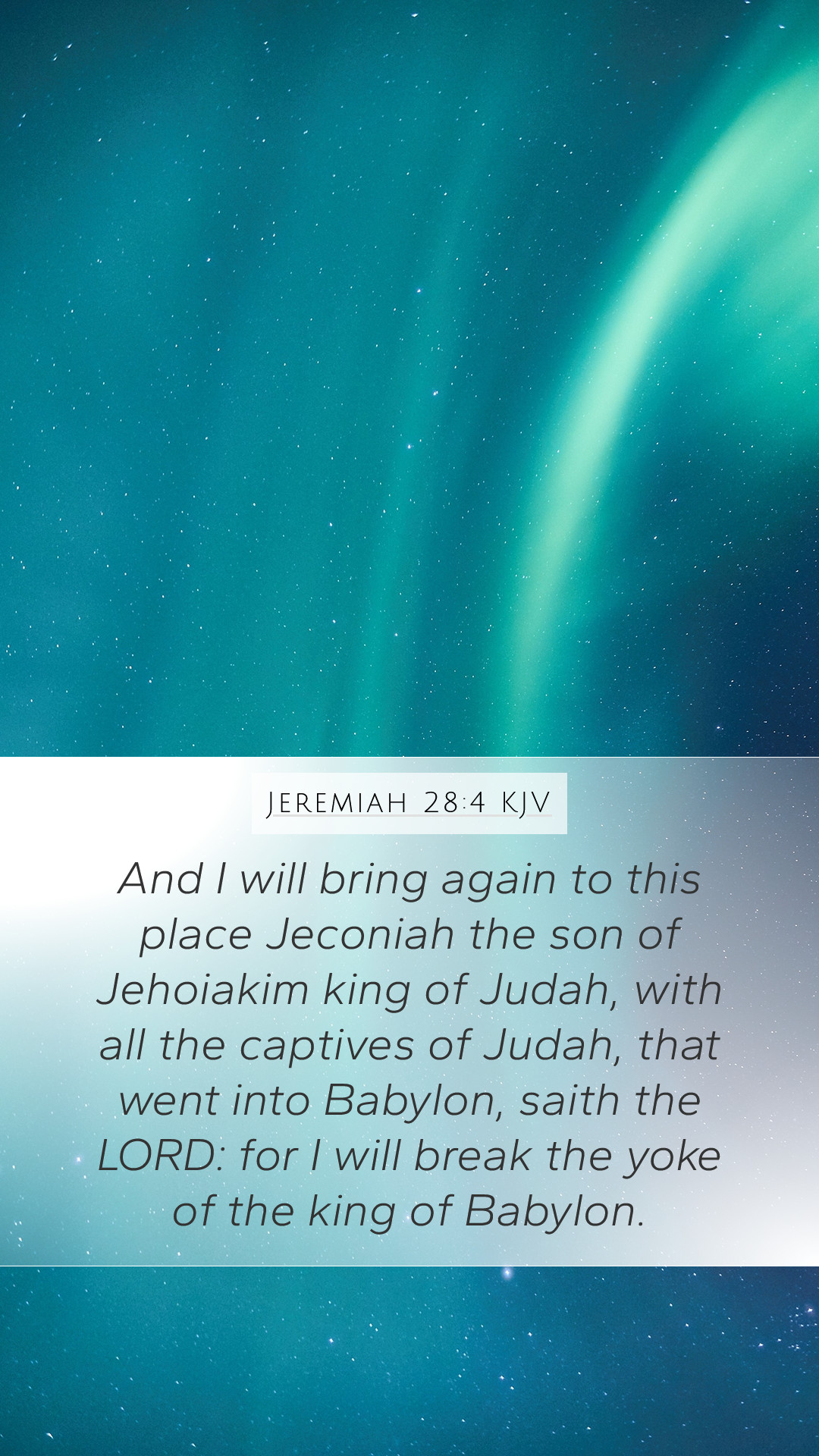Understanding Jeremiah 28:4
In this verse, the prophet Jeremiah conveys a message from the Lord that encompasses themes of hope, restoration, and the outcome of the exiles’ situation in Babylon. This passage serves as a crucial part of the prophetic dialogue during a tumultuous period in Israel's history.
Verse Context and Summary
Jeremiah 28:4 states: “And I will bring again to this place Jeconiah the son of Jehoiakim, king of Judah, with all the captives of Judah, that went into Babylon: saith the Lord; for I will break the yoke of the king of Babylon.” This proclamation reassures the people of Judah that their captivity would not last forever. The promise of bringing back Jeconiah and the captives indicates God’s compassion and fidelity to His covenant with Israel.
Bible Verse Meanings and Interpretations
This verse encapsulates several significant themes:
- Hope of Restoration: Both Henry and Clarke emphasize the hopeful message of restoration. This implies a divine promise that captures God’s desire to return His people to their homeland.
- Divine Sovereignty: Barnes highlights God’s authority over nations, revealing that despite the current oppression, God is in control, and He will act to liberate His people.
- Historical Context: The alliance between God’s prophecy and historical events is highlighted, illustrating that these promises were not mere metaphysical assurances, but were grounded in real historical realities.
- Symbol of Deliverance: The mention of Jeconiah (or Jehoiachin) symbolizes the possibility of divine intervention. The capitulation signifies broken chains, particularly the restoration of leadership and dignity for the exiled people.
Detailed Exegesis
The exegesis of this passage involves understanding the intricate relationships between the individuals mentioned and the overarching plan of God for His people:
- Jeconiah’s Leadership: His return represents a key aspect of leadership being restored to the nation, as suggested by Henry's analysis.
- Covenant Fulfillment: This restoration is consistent with God’s covenant with Israel. The term ‘captives’ points to both physical and spiritual redemption, ringing with the echoes of past deliverances as affirmed in Barnes' commentary.
- Counteracting False Prophecy: Jeremiah’s words serve to counteract false prophets who offered deceptive hope, showing that true prophets, as outlined by Clarke, are conduits of God’s genuine assurances to His people.
Practical Applications of Jeremiah 28:4
This verse is not just a historical message; it carries profound implications for contemporary believers:
- Faith in Times of Trouble: Just as the exiles found hope, believers today can find similar assurances in God’s promises amidst their struggles.
- Community Restoration: The verse encourages communities to hold onto promises of restoration, urging believers to work towards healing and unity.
- Understanding Prophecy: This passage exemplifies the importance of discerning true from false voices in today’s spiritual climates, relevant to those engaging in Bible study topics.
Further Cross-References
This verse connects deeply with several other scriptures, enriching our understanding:
- Isaiah 43:5-6: A parallel promise about gathering the people from the ends of the earth.
- Ezekiel 36:24: God’s promise to bring the Israelites back to their own land.
- Daniel 9:2: Daniel’s acknowledgment of the prophecies concerning the return of exiles.
Conclusion
Jeremiah 28:4, therefore, stands as a beacon of hope within the prophetic literature of the Old Testament. By understanding this Bible verse through various lenses of biblical commentary and exegesis, believers can glean insights that apply not only to their spiritual lives today but also to their communities and the greater world.
Final Reflections for Bible Study Groups
For those engaging in Bible study groups or seeking resources for online Bible study, this passage serves as a robust example of how to interpret and derive meaning from the text:
- Consider the cultural and historical implications of prophetic messages.
- Discuss how God’s character is revealed through His promises.
- Explore personal applications that relate to experiences of captivity or hope for restoration.


